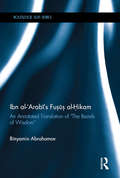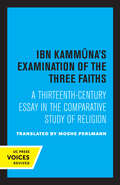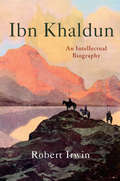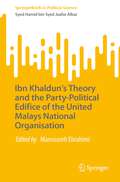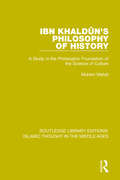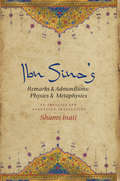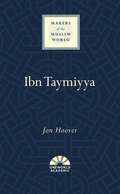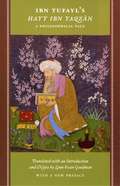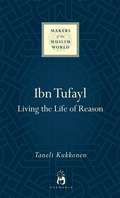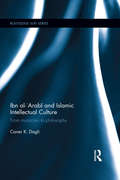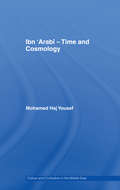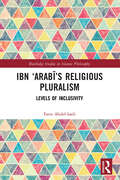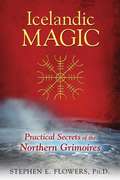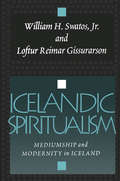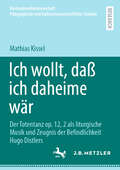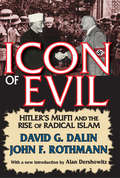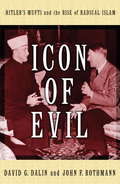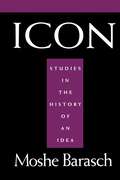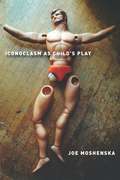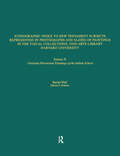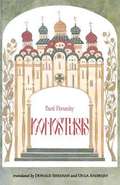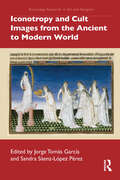- Table View
- List View
Ibn Al-Arabi's Fusus Al-Hikam: An Annotated Translation of "The Bezels of Wisdom" (Routledge Sufi Series)
by Binyamin AbrahamovIbn al-Arabi’s Fusus al-Hikam is a translation of one of the most important works written on Islamic Mysticism. Muhyi al-Din Ibn al-Arabi (1165-1240) is deemed the greatest mystic of Islam and his mystical philosophy has attracted the attention of both Muslims and non-Muslims from his time to the present day. Believing that the world is the self- manifestation of God, he claimed that all religions are equal and that the perfect human being is he who knows all the religious phenomena in the world. Fusus al-hikam examines the singular characteristics of twenty seven prophets of Islam and constitutes the best summary of Ibn al-Arabi's thought. The translation of these twenty seven chapters is preceded by an introduction that explains the main ideas of Ibn al-Arabi and is accompanied by explanatory notes to the text. Providing an easily accessible translation of one of the greatest mystics of Islam, Ibn al Arabi’ Fusus al-Hikam is essential reading for students, scholars and researchers of Islamic Philosophy, Mysticism and Islamic Mysticism in particular.
Ibn Gabirol's Theology of Desire
by Sarah PessinDrawing on Arabic passages from Ibn Gabirol's original Fons Vitae text, and highlighting philosophical insights from his Hebrew poetry, Sarah Pessin develops a "Theology of Desire" at the heart of Ibn Gabirol's eleventh-century cosmo-ontology. She challenges centuries of received scholarship on his work, including his so-called Doctrine of Divine Will. Pessin rejects voluntarist readings of the Fons Vitae as opposing divine emanation. She also emphasizes Pseudo-Empedoclean notions of "Divine Desire" and "Grounding Element" alongside Ibn Gabirol's use of a particularly Neoplatonic method with apophatic (and what she terms "doubly apophatic") implications. In this way, Pessin reads claims about matter and God as insights about love, desire, and the receptive, dependent, and fragile nature of human being. Pessin reenvisions the entire spirit of Ibn Gabirol's philosophy, moving us from a set of doctrines to a fluid inquiry into the nature of God and human being - and the bond between God and human being in desire.
Ibn Kammuna's Examination of the Three Faiths: A Thirteenth-Century Essay in the Comparative Study of Religion
by Moshe PerlmannThis title is part of UC Press's Voices Revived program, which commemorates University of California Press’s mission to seek out and cultivate the brightest minds and give them voice, reach, and impact. Drawing on a backlist dating to 1893, Voices Revived makes high-quality, peer-reviewed scholarship accessible once again using print-on-demand technology. This title was originally published in 1971.
Ibn Khaldun: An Intellectual Biography
by Robert IrwinThe definitive account of the life and thought of the medieval Arab genius who wrote the MuqaddimaIbn Khaldun (1332–1406) is generally regarded as the greatest intellectual ever to have appeared in the Arab world--a genius who ranks as one of the world's great minds. Yet the author of the Muqaddima, the most important study of history ever produced in the Islamic world, is not as well known as he should be, and his ideas are widely misunderstood. In this groundbreaking intellectual biography, Robert Irwin provides an engaging and authoritative account of Ibn Khaldun's extraordinary life, times, writings, and ideas. Irwin tells how Ibn Khaldun, who lived in a world decimated by the Black Death, held a long series of posts in the tumultuous Islamic courts of North Africa and Muslim Spain, becoming a major political player as well as a teacher and writer. Closely examining the Muqaddima, a startlingly original analysis of the laws of history, and drawing on many other contemporary sources, Irwin shows how Ibn Khaldun's life and thought fit into historical and intellectual context, including medieval Islamic theology, philosophy, politics, literature, economics, law, and tribal life. Because Ibn Khaldun's ideas often seem to anticipate by centuries developments in many fields, he has often been depicted as more of a modern man than a medieval one, and Irwin's account of such misreadings provides new insights about the history of Orientalism.In contrast, Irwin presents an Ibn Khaldun who was a creature of his time—a devout Sufi mystic who was obsessed with the occult and futurology and who lived in an often-strange world quite different from our own.
Ibn Khaldun’s Theory and the Party-Political Edifice of the United Malays National Organisation (SpringerBriefs in Political Science)
by Syed Hamid bin Syed Jaafar AlbarThis concise book examines the decline and erosion of UMNO as a dominant political party of Malaysia through the perspective of Ibn Khaldun's theory of asabiyyah and umran. It uses the qualitative method of data collection from Ibn Khaldun's original works. After discussing Ibn Khaldun's theory of asabiyyah and umran, UMNOs umranic contributions and erosion of Malay asabiyyah are discussed in detail. The research outlines how asabiyyah led to UMNOs rise to prominence, gain of political power, bringing of progress and development of Malaysia to an umranic stage before it started to decline and erode in concordance with the five stages of Ibn Khaldun's theory of rise and fall of civilizations. This book highlights that early leaders of UMNO played significant role in fostering group feeling and solidarity of the Malays (asabiyyah). Asabiyyah was the engine that propelled UMNO to transform the Malays and Malaysia to an umranic society. In conclusion, the later leaders of UMNO contributed to weakening of the Malay asabiyyah and the fall of UMNO from power in the 14th General Elections in 2018. The process of UMNOs decline and erosion of political power is primarily caused by the leaders’ failures and shortcomings. The author, a Malaysian lawyer and long-standing Minister in the Prime Minister's Department, Minister of Justice, Minister of Defence, Minister of Foreign Affairs, and Minister of Home Affairs in the Barisan Nasional in Malaysia, concludes with the recommendation that for UMNO to be relevant again in the current political landscape, it must initiate new and serious approaches and initiatives to change itself and must focus on good governance and rule of law in a multi-ethnic Malaysian society. Relevant to scholars and practitioners in political science, sociology, and Islamic studies, this book is a landmark commentary on contemporary Malaysian politics, drawing from the author's own experience as a member of parliament in his various ministerial positions over three decades.
Ibn Khaldûn's Philosophy of History: A Study in the Philosophic Foundation of the Science of Culture (Routledge Library Editions: Islamic Thought in the Middle Ages)
by Muhsin MahdiThis book, first published in 1957, is the study of 14th-century Arab historian Ibn Khaldun, who founded a special science to consider history and culture, based on the philosophy of Plato and Aristotle and their Muslim followers. In no other field has the revolt of modern Western thought against traditional philosophy been so far-reaching in its consequences as in the field of history. Ibn Khaldun realized that history is more immediately related to action than political philosophy because it studies the actual state of man and society. He found that the ancients had not made history the object of an independent science, and thought it was important to fill this gap. A factual acquaintance with the conclusions of Ibn Khaldun’s reflections on history is not the same as the full comprehension of their theoretical significance. When these fundamental questions are answered, it becomes possible to pose the specific question of the relation of Ibn Khaldun’s philosophy of history, or his new science of culture, to other practical sciences and, particularly, to the art of history. After an exposition of the major trends of Islamic historiography, part of this book attempts to answer this question through the analysis of the method and intention of the sections of the ‘History’ where Ibn Khaldun himself examines the works of major Muslim historians, shows the necessity of the new science of culture, and distinguishes it from other practical sciences.
Ibn Sina's Remarks and Admonitions: Physics and Metaphysics
by Shams C. InatiAl-Isharat wat-Tanbihat ( Remarks and Admonitions) is one of the most mature and comprehensive philosophical works of Ibn Sina (Avicenna, 980--1037). Grounded in an exploration of logic (which Ibn Sina described as the gate to knowledge) and happiness (the ultimate human goal), the text illuminates the divine, the human being, and the nature of things through a wide-ranging discussion of topics. The sections of Physics and Metaphysics deal with the nature of bodies and souls as well as existence, creation, and knowledge. Especially important are Ibn Sina's views of God's knowledge of particulars, which generated much controversy in medieval Islamic and Christian philosophical and theological circles and provoked a strong rejection by eleventh-century philosopher al-Ghazali.This book provides the first annotated English translation of Physics and Metaphysics and edits the original Arabic text on which the translation is based where it is corrupt or incomprehensible. It begins with a detailed analysis of the text, followed by a translation of the three classes or groups of ideas in the Physics (On the Substance of Bodies; On the Directions and Their Primary and Secondary Bodies; and On the Terrestrial and Celestial Souls) and the four in the Metaphysics (On Existence and Its Causes; Creation Ex Nihilo and Immediate Creation; On Ends, on Their Principles, and on the Arrangement [of Existence]; and On Abstraction. The Metaphysics closes with a significant discussion of the concepts of providence, good, and evil, which Ibn Sina uses to introduce a theodicy.Researchers, faculty, and students in philosophy, theology, religion, and intellectual history will find in this work a useful and necessary source for understanding Ibn Sina's philosophical thought and more generally the medieval Islamic and Christian study of nature, the world beyond, psychology, God, and the concept of evil.
Ibn Sina’s Remarks and Admonitions: An Analysis and Annotated Translation
by Shams C. InatiAl-Isharat wal-Tanbihat (Remarks and Admonitions) is one of the most mature and comprehensive philosophical works by Ibn Sina (Avicenna, 980–1037). Grounded in an exploration of logic (which Ibn Sina described as the gate to knowledge) and happiness (the ultimate human goal), the text illuminates the divine, the human being, and the nature of things through a wide-ranging discussion of topics. The sections of Physics and Metaphysics deal with the nature of bodies and souls as well as existence, creation, and knowledge. Especially important are Ibn Sina's views of God's knowledge of particulars, which generated much controversy in medieval Islamic and Christian philosophical and theological circles and provoked a strong rejection by eleventh-century philosopher al-Ghazali.This book provides the first annotated English translation of Physics and Metaphysics and edits the original Arabic text on which the translation is based. It begins with a detailed analysis of the text, followed by a translation of the three classes or groups of ideas in the Physics (On the Substance of Bodies, On the Directions and Their Primary and Secondary Bodies, and On the Terrestrial and Celestial Souls) and the four in the Metaphysics (On Existence and Its Causes, Creation Ex Nihilo and Immediate Creation, On Ends, on Their Principles, and on the Arrangement [of Existence], and On Abstraction. The Metaphysics closes with a significant discussion of the concepts of providence, good, and evil, which Ibn Sina uses to introduce a theodicy.Researchers, faculty, and students in philosophy, theology, religion, and intellectual history will find in this work a useful and necessary source for understanding Ibn Sina's philosophical thought and, more generally, the medieval Islamic and Christian study of nature, the world beyond, psychology, God, and the concept of evil.
Ibn Taymiyya (Makers of the Muslim World #73)
by Jon HooverIbn Taymiyya (1263–1328) of Damascus was one of the most prominent and controversial religious scholars of medieval Islam. He called for jihad against the Mongol invaders of Syria, appealed to the foundational sources of Islam for reform, and battled against religious innovation. Today, he inspires such diverse movements as Global Salafism, Islamic revivalism and modernism, and violent jihadism. This volume synthesizes the latest research, discusses many little-known aspects of Ibn Taymiyya&’s thought, and highlights the religious utilitarianism that pervades his activism, ethics, and theology.
Ibn Tufayl's Hayy Ibn Yaqzan: A Philosophical Tale
by Ibn Tufayl Lenn Evan GoodmanThe Arabic philosophical fable Hayy Ibn Yaqzanis a classic of medieval Islamic philosophy. Ibn Tufayl (d. 1185), the Andalusian philosopher, tells of a child raised by a doe on an equatorial island who grows up to discover the truth about the world and his own place in it, unaided--but also unimpeded--by society, language, or tradition. Hayy's discoveries about God, nature, and man challenge the values of the culture in which the tale was written as well as those of every contemporary society. Goodman's commentary placesHayy Ibn Yaqzanin its historical and philosophical context. The volume features a new preface and index, and an updated bibliography. "One of the most remarkable books of the Middle Ages. "--Times Literary Supplement "An enchanting and puzzling story. . . . The book transcends all historical and cultural environments to settle upon the questions of human life that perpetually intrigue men. "--Middle EastJournal "Goodman has done a service to the modern English reader by providing a readable translation of a philosophically significant allegory. "--Philosophy East and West "Add[s] bright new pieces to an Islamic mosaic whose general shape is already known. "--American Historical Review
Ibn Tufayl: Living the Life of Reason (Makers of the Muslim World)
by Taneli KukkonenIbn Tufayl (1105-1185) was an Andalusian courtier, philosopher, Sufi master, and royal physician to the Almohad Caliphs. He inspired the 12th-century Andalusian revolt against Ptolemaic astronomy and through his sponsorship he was also responsible for the career of the most renowned Aristotelian of medieval times, Abu al-Walid Ibn Rushd (the Latin Averroes). In Ibn Tufayl, we see an exemplar of the kind of versatile and pious scholar early Almohad culture wanted to cultivate.Ibn Tufayl's own intellectual outlook is preserved for us in Hayy Ibn Yaqzan, a philosophical romance that is one of the most beloved and best read pieces in all Arabic literature. A popular and often-copied work in early modern Europe, Hayy has for many come to represent what is distinctive of high classical Arabic philosophy. Ibn Tufayl sets one of the most famous Arabic philosophical works of all time in its historical and philosophical context: it paints a vivid portrait of the world as Ibn Tufayl saw it and as he wished for it to be seen.
Ibn al-'Arabī and Islamic Intellectual Culture: From Mysticism to Philosophy (Routledge Sufi Series)
by Caner K DagliIbn al-'Arabī (d. 1240) was one of the towering figures of Islamic intellectual history, and among Sufis still bears the title of al-shaykh al-akbar, or "the greatest master." Ibn al-'Arabī and Islamic Intellectual Culture traces the history of the concept of "oneness of being" (wahdat al-wujūd) in the school of Ibn al- 'Arabī, in order to explore the relationship between mysticism and philosophy in Islamic intellectual life. It examines how the conceptual language used by early mystical writers became increasingly engaged over time with the broader Islamic intellectual culture, eventually becoming integrated with the latter’s common philosophical and theological vocabulary. It focuses on four successive generations of thinkers (Sadr al-Dīn al-Qūnawī, Mu'ayyad al-Dīn al-Jandī, 'Abd al-Razzāq al-Kāshānī, and Dāwūd al-Qaysarī), and examines how these "philosopher-mystics" refined and developed the ideas of Ibn al-'Arabī. Through a close analysis of texts, the book clearly traces the crystallization of an influential school of thought in Islamic history and its place in the broader intellectual culture. Offering an exploration of the development of Sufi expression and thought, this book will be a valuable resource for students and scholars of Islamic thought, philosophy, and mysticism.
Ibn ‘Arabî - Time and Cosmology (Culture and Civilization in the Middle East)
by Mohamed Haj YousefThis book is the first comprehensive attempt to explain Ibn ‘Arabî’s distinctive view of time and its role in the process of creating the cosmos and its relation with the Creator. By comparing this original view with modern theories of physics and cosmology, Mohamed Haj Yousef constructs a new cosmological model that may deepen and extend our understanding of the world, while potentially solving some of the drawbacks in the current models such as the historical Zeno's paradoxes of motion and the recent Einstein-Podolsky-Rosen paradox (EPR) that underlines the discrepancies between Quantum Mechanics and Relativity.
Ibn ‘Arabī’s Religious Pluralism: Levels of Inclusivity (Routledge Studies in Islamic Philosophy)
by Faris Abdel-hadiThis book marks a significant contribution to the debate around Ibn ʿArabī’s religious pluralism, focusing on his multifaceted approach to non-Abrahamic religions.For nearly eight hundred years, the writings and ideas of the great Spanish Sufi master Ibn ʿArabī have shaped Islamic intellectual and spiritual culture, from North and West Africa and France on the one hand, to Iran, the Levant, Central Asia, and the Far East on the other. Modern scholarship on the “Greatest Master” is consequently at an all-time high. This book weighs in on a well-known aspect of his religious worldview, namely his perspective on religious pluralism, but does so from an entirely different angle. Offering a very close reading of his major works, newly translated by the author, and paying particular attention to a highly developed celestial metaphor prompted by his encounter with a group of pagan sun-worshippers, the book offers new insights into the nature and scope of Ibn ʿArabī’s understanding of Islamic inclusivism. Ultimately, the book contributes to our understanding of both interfaith dialogue and the history of world religions through the prism of Ibn ʿArabī’s work.The book will be of particular interest to students and scholars working in a range of fields, including Islamic philosophy, Sufism, and intellectual history.
Icelandic Magic: Practical Secrets of the Northern Grimoires
by Stephen E. FlowersA practical guide to the magical systems of pre-Christian Iceland • Reveals spells and workings drawn directly from surviving magical books from the 16th to 20th century preserved at the National Library in Reykjavík • Explores the history of magic in Iceland through original translations of Icelandic folktales about famous magicians and about legendary grimoires, such as the Galdrabók, the oldest and most complete book of its kind • Explains how to personalize the spells through the creation of unique signs and symbols based on the mythic names of Odin and Icelandic magical alphabets During the Christianization of Europe in the Middle Ages, many books of magic were lost as the ancient pagan traditions were suppressed. But in Iceland the practice of recording magical spells in books continued in secret for centuries, on a scale not seen elsewhere. Now housed in the National Library in Reykjavík, these surviving grimoires, which represent only a hundredth of what was lost, reveal a rich magical tradition that continued to evolve into the 20th century. Drawing directly from the actual surviving Icelandic books of magic, Stephen Flowers presents a complete system of magic based on Icelandic lore and magical practices from the 16th century onward. He explores the history of magic in Iceland in pagan and early Christian times and reveals specific practical techniques and ritual templates that readers can adapt to their unique purposes. Illustrating traditional Icelandic magical practices and the Icelanders’ attitudes toward them, he shares original translations of Icelandic folktales about famous magicians, such as the legend of Gray-Skin, and about legendary grimoires, such as the Galdrabók, the oldest and most complete book of its kind. After initiating the reader into the grammar and symbols of Icelandic magic through history and lore, Flowers then presents an extensive catalog of actual spells and magical workings from the historical Icelandic books of magic. These examples provide ready-made forms for practical experimentation as well as an exemplary guide on how to create signs and symbols for more personalized magical work. The author also includes guidance on creating unique magical signs from the 100 mythic names of Odin, which he translates and interprets magically, and from Icelandic magical alphabets, symbols that connect Icelandic magic to the ancient runic tradition.
Icelandic Spiritualism: Mediumship and Modernity in Iceland
by Loftur Reimar GissurarsonIcelandic Spiritualism is an engaging social anthropological study of the place of spiritualism in Icelandic church and society during the first half of the twentieth century. Challenging standard theoretical approaches to the study of religion, the book contributes a wealth of data on the history of religion and psychical research, presenting it in a vivid descriptive narrative.The authors trace the role of the spirit world in Icelandic culture, giving particular attention to the distinctive history of Iceland's "conversion" to Christianity. They focus on the appearance of "modern" spiritualism as a distinct phenomenon in Icelandic life. The book studies the interaction between various groups in fin-de-siecle Icelandic society, not least in the state church, as mediumistic phenomena became widely reported through the newspapers.To some, Icelandic spiritualism may be considered a deviant case of Protestantism. What makes this book interesting, however, is that the spiritualism is seen as integral to Iceland's transition to modernity. While Icelandic Spiritualism concentrates mainly on the first half of the twentieth century, it also provides a summary of the continuation of spiritualist phenomena up to the current period. This intriguing study will be of interest to theologians, philosophers, sociologists, psychologists, and anthropologists.
Ich wollt, daß ich daheime wär: Der Totentanz op. 12, 2 als liturgische Musik und Zeugnis der Befindlichkeit Hugo Distlers (Kirchenmusikwissenschaft. Pädagogische und kulturwissenschaftliche Studien)
by Mathias KisselDer Totentanz op. 12, 2 ist dem Verständnis seines Komponisten nach explizit liturgische Musik – er ist aber auch: Zeugnis seiner eigenen Befindlichkeit. Diese gibt er aber nicht dem ersten Blick preis, sondern in «verdeckter Gestalt». Um die Komposition in ihrer Janusköpfigkeit zu erschließen, bedarf es eines hermeneutischen Schlüssels, der zwischen dem Leben und den Lebensumständen des Komponisten auf der einen Seite und dem Werk auf der anderen Seite vermittelt. Als ein solcher Schlüssel erweist sich der Kondolenzbrief des Theologen Dietrich Bonhoeffers an die Witwe des Komponisten kurz nach dessen Selbstmord. Aus der «Synchronizität» zwischen dem Inhalt des Briefes und den verschiedenen Textschichtungen des Totentanz' op. 12. 2 leitet der Autor einen Kosmos von paradoxen Aussagen her, die gleichwohl nicht verdunkeln, sondern erhellen, indem sie zu Erkenntnissen führen, die jenseits der Sprache liegen und – obwohl vermittelt durch diese – in den epistemologischen Bereich der Imagination vorstoßen. Diese «Implosion» sprachlicher Antonymien setzt ein weites Geflecht von theologischen wie musikalischen Bezügen, die von der Gegenwart bis weit in die Vergangenheit reichen, frei.
Icon of Evil: Hitler's Mufti and the Rise of Radical Islam
by David DalinA chilling, fascinating, and nearly forgotten historical figure is resurrected in this riveting work that links the fascism of the last century with the terrorism of our own. Written with vigor and extraordinary access to primary sources in several languages, Icon of Evil is the definitive account of the man who, during World War II, was called "the fuhrer of the Arab world" and whose ugly legacy lives on today.With new and disturbing details, David G. Dalin and John F. Rothmann show how al -Husseini ingratiated himself with his hero, Adolf Hitler, becoming, with his blond hair and blue eyes, an "honorary Aryan" while dreaming of being installed as Nazi leader of the Middle East. Al-Husseini would later recruit more than 100,000 Muslims in Europe to fight in divisions of the Waffen- SS, and obstruct negotiations with the Allies that might have allowed four thousand Jewish children to escape to Palestine. Some believe that al-Husseini even inspired Hitler to implement the Final Solution. At war's end, al-Husseini escaped indictment at Nuremberg and was harbored in France.Icon of Evil chronicles al-Husseini's postwar relationships with such influential Islamic figures as the radical theoretician Sayyid Qutb and Saddam Hussein's powerful uncle General Khairallah Talfah and his crucial mentoring of the young Yasser Ararat. Finally, it provides compelling evidence that al-Husseini's actions and writings serve as inspirations today to the leaders of Hamas, Hezbollah, and other terrorist organizations pledged to destroy Israel and the United States.
Icon of Evil: Hitler's Mufti and the Rise of Radical Islam
by David G. Dalin John F. RothmannDalin (Hoover Institution, Stanford U. ) and Rothmann (Fromm Institute, U. of San Francisco) tell the story of Haj Amin al-Husseini, the one-time mufti of Jerusalem, and his support for the fascists during World War II. In the long-standing debate concerning whether Husseini's activities were driven by anti-Semitic hatred as opposed to anti-Zionism/Palestinian nationalism, they opt decisively for the former. Most of their discussion of Husseini's fascist activities will be relatively uncontroversial, although it's quite clear that when faced with choices of interpretation they are far more likely to chose the one that paints the mufti in a bad light, but their argument gets significantly weaker as they attempt to intimately connect Husseini to virtually every single opponent of the US and Israel in the Middle East including the Palestinian Liberation Organization, Saddam Hussein, Al-Qaeda, Hezbollah, and Hamas. Annotation ©2008 Book News, Inc. , Portland, OR (booknews. com)
Icon: Studies in the History of An Idea
by Moshe Barasch Luci SerranoOver the centuries, European debate about the nature and status of images of God and sacred figures has often upset the established order and shaken societies to their core. Out of this debate, an identifiable doctrine has emerged of the image in general and of the divine image in particular. This fascinating work concentrates on these historical arguments, from the period of Late Antiquity up to the great and classic defenses of images by St. John of Damascus and Theodore of Studion. Icon extends beyond the immediate concerns of religion, philosophy, aesthetics, history, and art, to engage them all.
Iconoclasm As Child's Play
by Joe MoshenskaWhen sacred objects were rejected during the Reformation, they were not always burned and broken but were sometimes given to children as toys. Play is typically seen as free and open, while iconoclasm, even to those who deem it necessary, is violent and disenchanting. What does it say about wider attitudes toward religious violence and children at play that these two seemingly different activities were sometimes one and the same? Drawing on a range of sixteenth-century artifacts, artworks, and texts, as well as on ancient and modern theories of iconoclasm and of play, Iconoclasm As Child's Play argues that the desire to shape and interpret the playing of children is an important cultural force. Formerly holy objects may have been handed over with an intent to debase them, but play has a tendency to create new meanings and stories that take on a life of their own. Joe Moshenska shows that this form of iconoclasm is not only a fascinating phenomenon in its own right; it has the potential to alter our understandings of the threshold between the religious and the secular, the forms and functions of play, and the nature of historical transformation and continuity.
Iconographic Index to New Testament Subjects Represented in Photographs and Slides of Paintings in the Visual Collections, Fine Arts Library, Harvard University: Christian Devotional Paintings of the Italian School
by Rachel Hall with Helene E. RobertsThis vast reference resource will appeal to anyone who wishes to find depictions of New Testament narratives from scholars, to students, to picture researchers. The first part of the book consists of a list of proper names, terms, and concepts relating to New Testament narratives represented. Under each name, term or concept, the ICONCLASS alphanumeric codes are entered, along with a brief description of the New Testament scenes in which the characters or actions occur. The second part of this text is organized according to the ICONCLASS alphanumeric codes, their order reflecting the Biblical sequence of narrative.
Iconostasis
by Pavel FlorenskyIconostasis is Fr. Pavel's final theological work. Composed in 1922, it explores in highly original terms the significance of the icon: its philosophic depth, its spiritual history, its empirical technique. In doing so, Fr. Pavel also sketches a new history of both Western religious art and the Orthodox icon: a history under the direct operation of the Holy Spirit. The work is original, challenging and profoundly articulate. This translation is the first complete English version.
Iconotropy and Cult Images from the Ancient to Modern World (Routledge Research in Art and Religion)
by Jorge Tomás GarcíaThe book examines the process of symbolic and material alteration of religious images in antiquity, the middle ages and the modern period. The process by which the form and meaning of images are modified and adapted for a new context is defined by a large number of spiritual, religious, artistic, geographical or historical circumstances. This book provides a defined theoretical framework for these symbolic and material alterations based on the concept of iconotropy; that is, the way in which images change and/or alter their meaning. Iconotropy is a key concept in religious history, particularly for periods in which religious changes, often turbulent, took place. In addition, the iconotropic process of appropriating cult images brought with it changes in the materiality of those images. Numerous accounts from antiquity, the middle ages and the modern period detail how cult images were involved in such processes of misinterpretation, both symbolically and materially. The book will be of interest to scholars working in art history, visual culture and religious history.
Iconotropy and Cult Images from the Ancient to Modern World (Routledge Research in Art and Religion)
by Jorge Tomás GarcíaThe book examines the process of symbolic and material alteration of religious images in antiquity, the middle ages and the modern period. The process by which the form and meaning of images are modified and adapted for a new context is defined by a large number of spiritual, religious, artistic, geographical or historical circumstances. This book provides a defined theoretical framework for these symbolic and material alterations based on the concept of iconotropy; that is, the way in which images change and/or alter their meaning. Iconotropy is a key concept in religious history, particularly for periods in which religious changes, often turbulent, took place. In addition, the iconotropic process of appropriating cult images brought with it changes in the materiality of those images. Numerous accounts from antiquity, the middle ages and the modern period detail how cult images were involved in such processes of misinterpretation, both symbolically and materially.The book will be of interest to scholars working in art history, visual culture and religious history.
